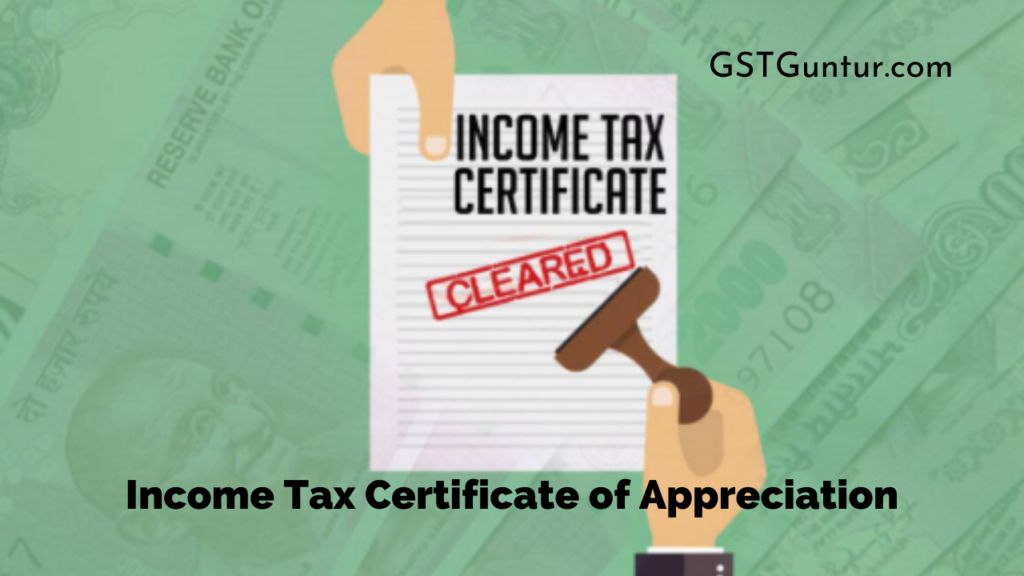Income Tax Certificate of Appreciation: The Income Tax department has initiated a unique and new thank you certificate for honest tax-payers. By sending an email thanking them along with a certificate of Appreciation. From Assessment Year 2016-17, Income Tax Department has started assigning the Income Tax appreciation Certificate for eligible tax-payers who clear their entire liability, have no outstanding tax liabilities and have filed their returns electronically in the prescribed time. This article will explain the appreciation certificate for paying the Income Tax and What are these Certificates of Appreciation given for?
Income Tax Definition
Income Tax in India is the taxes that are collected from the income of an individual. These individuals are identified as taxpayers. The taxpayers pay a fixed amount from their earnings of the provided financial year directly to the country’s government. This ‘fixed rate’ is pre-defined by the Income Tax Department (ITD). The taxpayers are required to pay income tax on every income they make, which means any amount won or earned is subjected to tax. So, this indicates even lottery champions require to pay income tax.
Certificate of Appreciation
The Income Tax department gives the certificate of appreciation as a token of appreciation to the honest tax-payers. The government has initiated this step to acknowledge the taxpayer’s contribution. The certificates are sent to taxpayers by email in multiple categories based on the taxes given by them. The eligibility to get the appreciation certification depends on the tax and is not based on the income range. The total tax depends on the income received from these five starts:
- Income from Salary,
- Income from capital gains,
- Income from marketing,
- House property income, and
- earnings from other sources.
Therefore, if someone has not received the appreciation certificate from the Central Board of Direct Taxes (CBDT) in spite of giving your taxes, its because he/she has not paid their taxes on time or completed the ITR process within time or didn’t file the income tax return (ITR) on time. One can visit the online website of the IT office to check if their ITR has been processed or not.
Income Tax Certificate of Appreciation Eligibility
The Central Board of Direct Taxes (CBDT) has been giving an appreciation certification to tax-payers by mail, who had given the tax on time. Besides, the ITR has to be registered online within the due date and also confirmed within 120 days. The verification method can be accomplished through Electronic Verification Code (EVC) or Digital Signature or submission of signed ITR-V to Centralized Processing Centre Bangalore. Following are the steps to check and download the appreciation certificate.
- Login to the website of “www.incometaxindiaefiling.gov.in”
- Go to the menu ‘My Account’ to the left side of the screen and click on ‘Certificate of Appreciation.’
- Download the certificate by clicking the download option.
If the certificate of appreciation is not sent by any chance, then the following steps will help you ask for help in resending the certificate.
- Log in to the website of “www.incometaxindiaefiling.gov.in”
- Click on the menu ‘My Account’ on the left side of the screen and click the ‘Service Request’ button. Then select ‘New Request’ and click the category for request as ‘Certificate of Appreciation’ and click ‘Submit.’
- Select the AY from the list and click on done.
The Category’s
The income tax department mails an email to the tax-payer, which includes the required items – a certificate of appreciation – that can be downloaded, published and framed for posterity.
- Bronze category: The Bronze category is for those who have paid the income tax from the range of Rs 1 lakh to Rs 10 lakh per year.
- Silver category: This category is for those who have paid income tax from Rs 10 lakh to Rs 50 lakh.
- Gold category: This category belongs to those who have paid the tax within Rs 50 lakh to Rs 1 crore.
- Platinum category: The platinum category is the last category that has paid income tax of Rs 1 crore and beyond.
Why the Certificate of Appreciation?
The Central Board of Direct Taxes (CBDT) terms this movement as the first attempt by the administration to communicate to the taxpayer and appreciate their contribution. CBDT encourages the taxpayers to publicise these records in their houses and offices.
On the 19th of September 2016, the Circular of the Income Tax Website stated that –
“The Government had approved each taxpayer’s participation in paying taxes within the assigned period and the Honourable Finance Minister, Shri Arun Jaitley, has awarded certificates of appreciation published by CBDT venerating the selected taxpayers for their contribution. Through this step, the Government tries to directly communicate with the taxpayer and appreciate them for their contribution.”
Conclusion on Income Tax Certificate of Appreciation
Income Tax payment is an essential aspect of a functioning economy. It is the fuel on which an economy moves. Every citizen who falls under the payable tax bracket is expected to pay their income dues in a timely manner so that the developmental processes of a nation can keep on continuing.
However, paying income tax can be a mundane job with no apparent positive reinforcement of any kind. With the introduction of the Income-tax appreciation certificate, the department is trying to acknowledge the service that one has done to the nation by paying one’s taxes. There is also the case of the Income Tax department trying to change its appearance and image and, in the process, become more tax-payer friendly. This has been achieved through measures such as polite language, less physical interaction, lesser intrusive assessment, and the newly introduced appreciation certificate. This article will help the reader understand all about the appreciation certificate, who is eligible, and how it is the handout.
